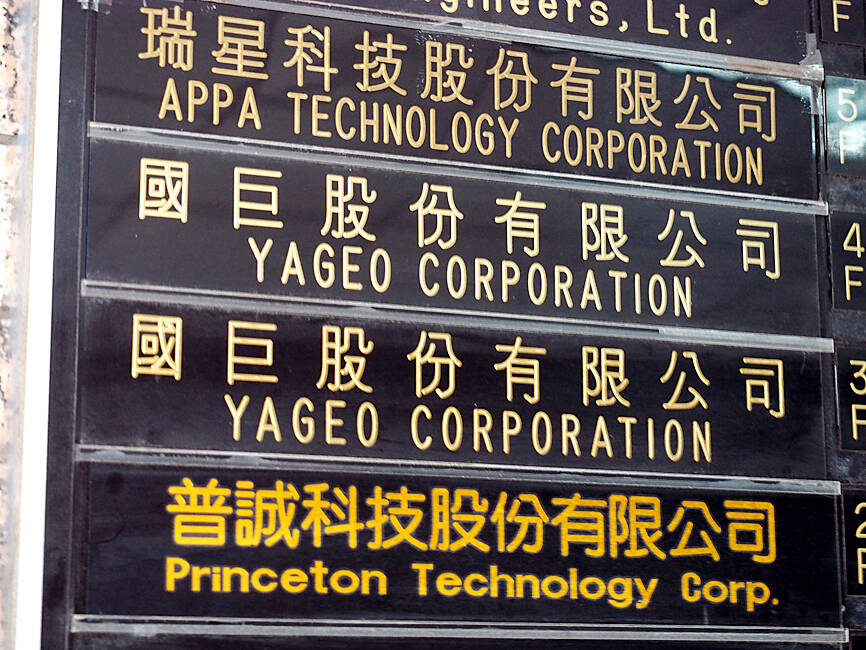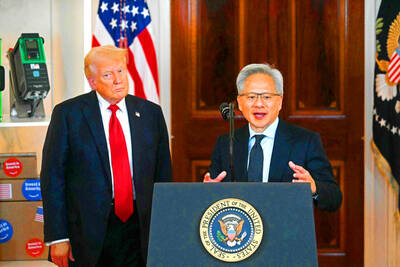Yageo Corp (國巨) for a second consecutive year placed first among listed firms for board compensation last year, Taiwan Stock Exchange data showed yesterday.
The world’s third-largest multilayer ceramic capacitor supplier distributed compensation of NT$87.66 million (US$2.87 million) on average to each director, the data showed.
The figure was 4.6 percent lower than a year earlier, as the company’s net profit fell 0.7 percent from 2021, the data showed.

Photo: David Chang, EPA-EFE
Taiwan Semiconductor Manufacturing Co (TSMC, 台積電) climbed to second place with average compensation of NT$74.39 million to each director, up 46 percent from a year earlier, as the world’s largest contract chipmaker’s net profit rose 70 percent annually, the exchange said.
CTBC Financial Holding Co (中信金控) fell one spot to third place, with average compensation of NT$62.46 million, down 15 percent annually, after its net profit contracted 42.29 percent from the previous year, exchange data showed.
Three other financial holding companies in the top 10 also paid their board directors less than last year, as their net profits were affected by financial market volatility, interest-rate hikes and huge payouts to COVID-19 insurance policyholders.
For example, Yuanta Financial Holding Co (元大金控) took fifth place as its average compensation fell 30 percent to NT$28.3 million, China Development Financial Holding Corp (中華開發金控) ranked sixth with average compensation down 31 percent to NT$26.73 million and Taishin Financial Holding Co (台新金控) ranked eighth with average compensation declining 24.5 percent to NT$24.08 million, the data showed.
The remaining companies among the top 10 are Largan Precision Co (大立光) at fourth place with NT$37.38 million, Powerchip Semiconductor Manufacturing Corp (力積電) at seventh with NT$25.27 billion, Lite-On Technology Corp (光寶科技) at ninth with NT$23.83 billion and Uni-President Enterprises Corp (統一企業) in the No. 10 spot with NT$23.63 billion.
Yageo’s overall board compensation made up 3.47 percent of its net profit last year, the highest among the top 10, compared with TSMC with a ratio of 0.07 percent and CTBC Financial’s 1.39 percent, exchange data showed.
With listed firms’ aggregate pretax profits falling 6.08 percent annually to NT$4.62 trillion last year, 38 companies paid average compensation of NT$10 million or more, compared with 52 in 2021, the data showed.

Taiwan Semiconductor Manufacturing Co (TSMC, 台積電) last week recorded an increase in the number of shareholders to the highest in almost eight months, despite its share price falling 3.38 percent from the previous week, Taiwan Stock Exchange data released on Saturday showed. As of Friday, TSMC had 1.88 million shareholders, the most since the week of April 25 and an increase of 31,870 from the previous week, the data showed. The number of shareholders jumped despite a drop of NT$50 (US$1.59), or 3.38 percent, in TSMC’s share price from a week earlier to NT$1,430, as investors took profits from their earlier gains

AI TALENT: No financial details were released about the deal, in which top Groq executives, including its CEO, would join Nvidia to help advance the technology Nvidia Corp has agreed to a licensing deal with artificial intelligence (AI) start-up Groq, furthering its investments in companies connected to the AI boom and gaining the right to add a new type of technology to its products. The world’s largest publicly traded company has paid for the right to use Groq’s technology and is to integrate its chip design into future products. Some of the start-up’s executives are leaving to join Nvidia to help with that effort, the companies said. Groq would continue as an independent company with a new chief executive, it said on Wednesday in a post on its Web

CHINA RIVAL: The chips are positioned to compete with Nvidia’s Hopper and Blackwell products and would enable clusters connecting more than 100,000 chips Moore Threads Technology Co (摩爾線程) introduced a new generation of chips aimed at reducing artificial intelligence (AI) developers’ dependence on Nvidia Corp’s hardware, just weeks after pulling off one of the most successful Chinese initial public offerings (IPOs) in years. “These products will significantly enhance world-class computing speed and capabilities that all developers aspire to,” Moore Threads CEO Zhang Jianzhong (張建中), a former Nvidia executive, said on Saturday at a company event in Beijing. “We hope they can meet the needs of more developers in China so that you no longer need to wait for advanced foreign products.” Chinese chipmakers are in

POLICY REVERSAL: The decision to allow sales of Nvidia’s H200 chips to China came after years of tightening controls and has drawn objections among some Republicans US House Republicans are calling for arms-sale-style congressional oversight of artificial intelligence (AI) chip exports as US President Donald Trump’s administration moves to approve licenses for Nvidia Corp to ship its H200 processor to China. US Representative Brian Mast, the Republican chairman of the US House Committee on Foreign Affairs, which oversees export controls, on Friday introduced a bill dubbed the AI Overwatch Act that would require the US Congress to be notified of AI chips sales to adversaries. Any processors equal to or higher in capabilities than Nvidia’s H20 would be subject to oversight, the draft bill says. Lawmakers would have